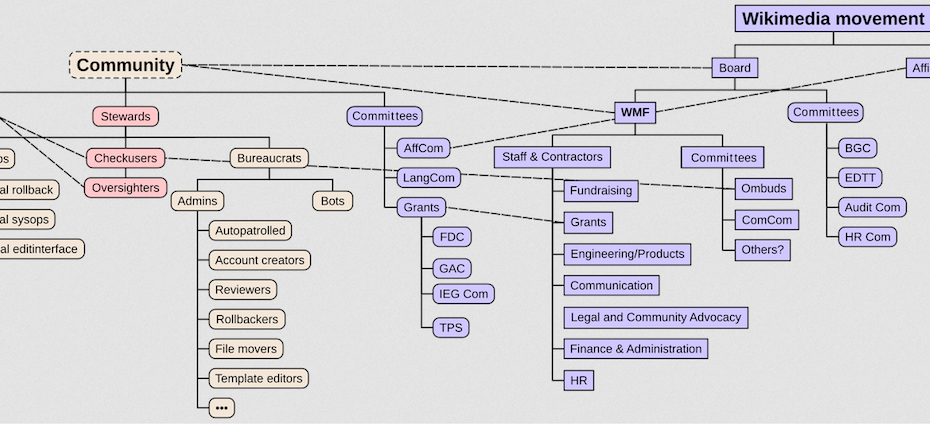In the second half of 2020 the Wikimedia Foundation received 380 requests for content alteration and takedown. Two were granted. This is because our communities do an outstanding job in moderating the sites. Something the Digital Services Act negotiators should probably have in mind.
See the organisational chart in full here
Wikipedia is a top 10 website globally anyone can edit and upload content to. Its sister projects host millions of files uploaded by users. Yet, all these projects together triggered only 380 notices. How in the world is this possible?
Community moderation
The answer is sometimes surprising: Wikimedia’s editing communities do an outstanding job in moderating content. Most projects and their language versions, however, have slightly different rules. You may compare the English Wikipedia’s notability guidelines to the German Wikipedia’s Relevanzkriterien. They are similar, but there are differences. The German rules are more specific. There are, for instance, clear criteria on which film festivals can be included (they need to fulfill at least two out of six listed criteria). On English Wikipedia these are covered as regular events. As within the EU, there is some common understanding, but the rules and their application are in the hands of independent, language and project based communities. These communities, made up of editors who have a certain amount of contributions, vote on rules and elect among themselves users who take on roles such as administrators and patrollers and become responsible for applying the rules.
Legal Team
The Wikimedia Foundation operates on another level. It hosts the projects and is committed to protecting their integrity and ensuring all individuals have access to free knowledge regardless of where they are in the world. This also means that the legal team does thoroughly vet notices and requests and only grants the ones that are legally sound. It helps that the main priority is to ensure access to knowledge and respect for the law, not to avoid potential lawsuits.
Types of requests the Wikimedia Foundation (WMF) received
Content alteration and takedown requests
From July to December 2020, the WMF received 380 requests to alter or remove content from the Wikimedia projects. Due to exceptional circumstances, two were granted. Both requests arose from European court cases for which the community could not receive full information due to judicial confidentiality, in which the alleged impact on the article subjects in question was high, and the legal posture of the cases required prompt action. For the 378 requests that were not granted, the legal team responded, as usual, by clarifying to good faith requesters how Wikimedia projects work and directing them to the appropriate volunteer communities.
Copyright takedown requests
Since most content on Wikimedia is freely licensed, within the public domain, or reused under an appropriate copyright exception such as US fair use, the Wikimedia Foundation is very careful to ensure the validity of requests before taking any action. This cycle, the WMF received 21 requests and granted two of them.
Right to erasure
This cycle, the WMF received 12 right to erasure requests and granted none of them. When the Foundation receives right to erasure-based requests related to user accounts, the legal team provides the user information on the community-driven vanishing process. However, when they receive requests regarding project content that includes information about a living person, they first direct the user to experienced project volunteers who review and address the requests in accordance with project guidelines for living persons.
Requests for Nonpublic User Data
Requests for nonpublic user data are taken seriously in order to protect our community members’ privacy. During the second half of 2020, the Wikimedia Foundation received 32 requests to disclose nonpublic information about users; and complied with two, both of which were subpoenas. While these 32 requests concerned as many as 3,119 user accounts, only four user accounts were actually affected by Foundation disclosures. As always, the Foundation only granted requests after ensuring the requests were legally valid and followed the Requests for user information procedures and guidelines.
Emergency Disclosures
Emergency Disclosures include both Voluntary Disclosures the WMF makes by contacting law enforcement after becoming aware of concerning information on Wikimedia projects and urgent Emergency Requests for information received from law enforcement. Since the last Transparency Report was issued, the legal team voluntarily disclosed information 17 times and received no Emergency Requests.
See the full Transparency Report.This post is partially based on an article by Jim Buatti and Cristina Butoiu of the Wikimedia Foundation.









